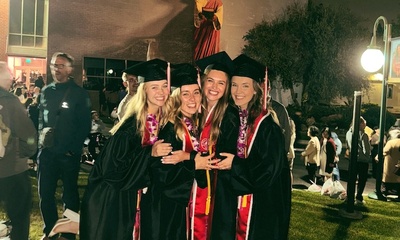Keeping In Touch After College

As the end of my last semester approaches, there are a lot of things I am eager to leave behind: early morning classes, noisy dorm neighbors, the constant flow of homework and extremely long nights of studying. To say goodbye to finals and exams is a dream! But to say goodbye to some of my closest friends…?
I’ve heard it put this way before, college is like a pressure cooker for friendships. They place thousands of people who are in the same stage of life in one small area to live and then put them all under immense pressure. The result is a lot of sleepless nights, a lot of laughter, and quick-forming deep relationships. The speed and depth at which these friendship are formed make them feel virtually inseparable. They are secure and dependable to the point where, when you come home for summer, you can fully expect them to be exactly the same when you return.
But what do you do when you reach your last “break”? This question has plagued me all semester as I receive graduation email after graduation email. The friends I’ve made at Biola really have been some of the closest and deepest friendships I’ve ever had. Their constant companionship through the last four years of my life have changed me for the better, so the idea of living some of the most intimidating years of my life without them by my side is horribly lonely.
“From the time we're in kindergarten to when we graduate college, friendship-making is such an important part of our social and personal development, it's almost not even optional. We need to make friends to find out who we are, where we fit in with our peers, how to navigate social situations…” - from “Why It’s So Hard to Make Friends After College” by Melanie Pinola.
Both for myself and for others who are coping with this same fear, I asked some Biola alumni what their experiences have been after college. In the end, and what I’ve been hearing over and over again is that: it all comes down to intentionality. Since you and your friends won’t be seeing each other every day anymore (unless you’re lucky enough to find a job in the same company), there won’t be casual, routine lunches or the opportunity to walk to class together every week. You will no longer know what’s going on in each other’s lives constantly, which means it may take some deliberate planning around schedules to catch up. This means, if there is a specific friend in your life that you really want to keep around (and I think we all have at least one of those), you need to text or email them purposefully and frequently enough to keep the connection.
One of the people I spoke with was CMR’s own Ben Longinow who graduated in 2012. He told me about a friend he had during his time in undergrad who became a much closer friend after graduation rather than before. “We lived in the same dorm for two years but I wasn’t that close to him. After Biola we stayed in touch and even though we moved away, we were still able to keep up with what was going on in the other person’s life … He was in my wedding, and now I’m going to be in his wedding!” When asked how this friendship was able to blossom over a distance, he explained, “I didn’t expect to get closer with him. One of the things with friendships after college is they typically take more work … and I just noticed that when I would reach out to him, he would reach out to me later. If there was something that reminded me of him I would text him a picture of it and he would do the same for me, so I thought, “Oh, he cares about the friendship, he is investing in the friendship.”
In summary, graduation does not have to mean the end of friendship--it can, in fact, open the door to test and expand previous friendships in newer and deeper ways. This works best when both friends initiate conversation regularly, rather than waiting for the other. Here are some more detailed ideas on keeping in touch with friends post-graduation:
- Create or keep up with the group chat
- If you and your friends made a group chat in college, this is a great way to keep the ball rolling with minimal effort. When people text in a group chat after long periods of time, it can bring them back to the days when the chat was used frequently! This is also a great way to share news quickly with others so they can stay updated on your life events too.
- Prioritize each other’s birthdays
- One fun way to remind a friend you don’t talk to often that you still care is to do a little something for their birthday every year. This can vary from sending a long text (more than a simple, “Happy Birthday!”) to making plans to visit them. Whatever your budget and time allow, giving friends that extra bit of effort on their special day can keep the two of you feeling close.
- Watch T.V. Shows “Together”
- This one can span distance and time zones--the basic goal is to choose a show the two of you want to watch and watch it when you each have time. Afterwards, you can text about it and discuss thoughts, theories, and opinions. If Netflix was your thing together in college, it can keep the flame alive after college too. This is also a great way to find new content to watch when you need change.
- Send each other letters
- Another way to keep your friendship alive is to send letters to each other every once in a while. Remaining pen pals can take the weight off of your shoulders if you feel overwhelmed at the thought of scheduling a phone call. This way, each of you can find time to write each other back with updates on your lives without needing to schedule ahead of time. Writing can be worked in anytime around even the busiest schedules. The personalized gesture is fulfilling and unique as well!
Despite all of these efforts, however, it is important to keep in mind that life impacts relationships too. Sometimes you can try your hardest and put in a lot of effort to sustain an old friendship, but outside circumstances cause people to become more distant, they both change or other new priorities fill up their lives. When this happens, there is hope. Friends can be found in all kinds of places--they just take more effort to find.
“It’s painful when that fertile environment disappears—suddenly, your work, home life, and church life are often completely separate. Add to that our individualistic culture and even the most gregarious and well-connected of us can battle to create community,” - Heather Caliri in “What I Wish I’d Known About Friendship After College.”
This quote encapsulates one of the things I will miss the most about college and why life after will be very different. College has a strong sense of community a very, “we’re all in this together,” mindset which makes friendships so easy to form. Life after is a bit of a no man's zone. People you encounter in your workplace may not be as friendship-ready as your college peers. There also likely won’t be as many people in your age-group as before. Because of this, we will have to always keep an open mind when meeting others, you never know how they will be able to impact your life. Look for kind people in places you normally wouldn’t (maybe even in age groups you normally wouldn’t) and brace yourself to be challenged socially and in your faith.
Here is a quick list of some ways you can make new friends post-graduation:
- Get involved in a hobby class/workshop/club!
- This is a key way to find people that definitely have something in common with you! What are you passionate about outside of your career? What have you always wanted to try, but haven't? Find a hobby that other people are involved in and join a group that gets together to do it!
- Join a sports league for adults!
- There are forms of intramural sports teams for adults that are always recruiting. Check in at your city’s recreational center and see if there are any you can join! For example, the rec center in my hometown hosts casual badminton games a couple of times a week. I have attended with some high school friends and we have been able to meet some hilarious and outgoing people!
- Meet a friend of a friend!
- Do any of your friends have friends in the city you now live in already? How about relative’s friends? If you have any potential connections, pull up your courage and reach out! You never know if you end up hitting it off!
- Lastly, and this is a classic, stay involved in a church!
- More than just attending every Sunday (while this is very important too), get involved in a ministry or activity! Smaller, more team-based settings are great catalysts for potential friendships because you have to get to know each other.




